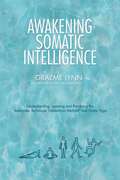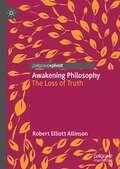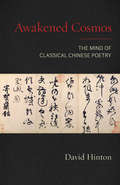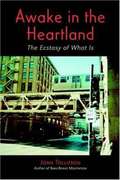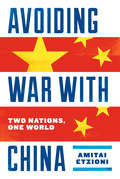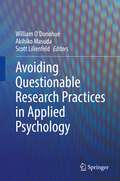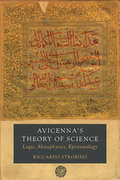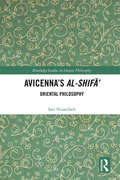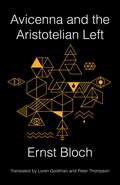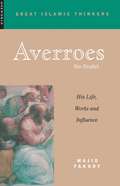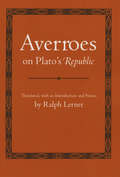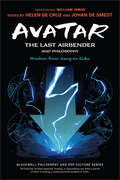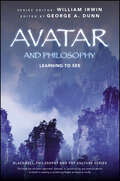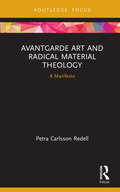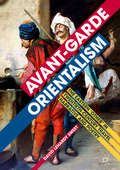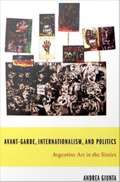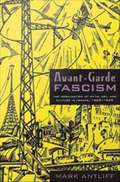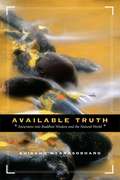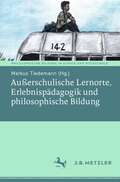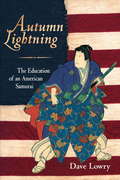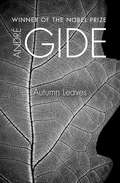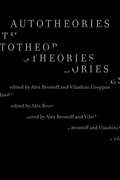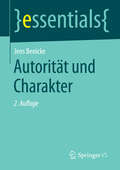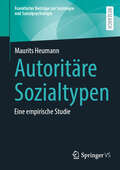- Table View
- List View
Awakening Somatic Intelligence: Understanding, Learning & Practicing the Alexander Technique, Feldenkrais Method & Hatha Yoga
by Graeme LynnFocussing on distinct body practice from a range of different methods, Graeme Lynn demonstrates how to use the physical body to encourage general health and wellbeing. Starting with the fundamental concepts of movement to more advanced practice, this book will serve as a comprehensive guide to developing the physical body to transform the quality of movement, and bring greater pleasure and effectiveness into every action. Specific lessons include The Alexander Technique, The Feldenkrais Method, and Hatha Yoga. Describing the core benefits of these methods, why they complement each other and how to use them, this is essential reading for students and practitioners of somatic methods as well as anyone interested in learning new ways to optimise health and wellbeing.
Awakening Philosophy: The Loss of Truth
by Robert Elliott AllinsonIn this original book, Robert Elliott Allinson asserts that philosophers have been lulled into a dogmatic sleep by Immanuel Kant, the slayer of metaphysics, who has convinced them (and the rest of humanity) that we can never know Reality. Allinson awakens global philosophers from their sceptical slumbers by diagnosing the reason why they have abdicated their traditional calling as leaders of inquiry into truth and wisdom.
Awakened Cosmos: The Mind of Classical Chinese Poetry
by David HintonA deep and radically original exploration of Taoist and Ch'an (Zen) Buddhist wisdom through the lens of the life and work of Tu Fu, widely considered China's greatest classical poet.What is consciousness but the Cosmos awakened to itself? This question is fundamental to the Taoist and Ch'an (Zen) Buddhist worldview that shapes classical Chinese poetry. A uniquely conceived biography, Awakened Cosmos illuminates that worldview through the life and work of Tu Fu (712-770 C.E.), China's greatest classical poet. Tu Fu's writing traces his life from periods of relative normalcy to years spent as an impoverished refugee amid the devastation of civil war. Exploring key poems to guide the reader through Tu Fu's dramatic life, Awakened Cosmos reveals Taoist/Ch'an insight deeply lived across the full range of human experience.Each chapter presents a poem in three stages: first, the original Chinese; then, an English translation in Hinton's masterful style; and finally, a lyrical essay that discusses the untranslatable philosophical dimensions of the poem. The result is nothing short of remarkable: a biography of the Cosmos awakened to itself in the form of a magisterial poet alive in T'ang Dynasty China.Thirty years ago, David Hinton published America's first full-length translation of Tu Fu's work. Awakened Cosmos is published simultaneously with a newly translated and substantially expanded version of that landmark translation: The Selected Poems of Tu Fu: Expanded and Newly Translated (New Directions).
Awake In The Heartland: The Ecstasy of What is
by Joan TollifsonThis is a book about waking up. It's not about techniques, dogmas, traditions, exotic states or future attainments. Rather, it points to the simplicity and wonder of what is, as it is. This is a book about discovering perfection in imperfection, and the extraordinary in the ordinary. It's about enlightenment, not a future attainment, but here and now. It celebrates life as it is, from the beautiful to the horrific, inviting the reader to see that everything is spiritual, and that nothing is a mistake. If there seems to be a gap between what the enlightenment books describe and what you find in your own life, if you still think enlightenment is something that will happen to you in the future (or not at all), if you're still chasing experiences or self-improvement, then this book may be just what you need to see that what you seek is already here. There is a vibrant energy that emanates from the pages of this book that cannot help but resonate with and stir the same essence in the reader and awaken them to the ecstasy of what is-their own true nature. Because the personal story is so beautifully interwoven, the book answers the question so often asked by seekers: "Yes, I under stand BUT...How do I live my life?" Joan is constantly showing the reader, by personal example, that life lives itself as IS no matter WHAT appears. I recommend it. - Sailor Bob Adamson
Avoiding War with China: Two Nations, One World
by Amitai EtzioniAre the United States and China on a collision course? In response to remarks made by Donald Trump’s secretary of state, China’s state-run newspaper Global Times asserted, "Unless Washington plans to wage a large-scale war in the South China Sea, any other approaches to prevent Chinese access to the [disputed] islands will be foolish." Some experts contend that conflict is inevitable when an established power does not make sufficient room for a rising power. In this timely new work, renowned professor of international relations Amitai Etzioni explains why this would be disastrous and points to the ways the two nations can avoid war.The United States is already preparing for a war with China, Etzioni reveals. However, major differences of opinion exist among experts on the extent of military commitment required, and no plan has been formally reviewed by either Congress or the White House, nor has any been subjected to a public debate. Etzioni seeks here to provide a context for this long overdue discussion and to explore the most urgent questions: How aggressive is China? How powerful is it? Does it seek merely regional influence, or regional dominance, or to replace the United States as the global superpower?The most effective means of avoiding war, several experts argue, requires integrating China into the prevailing rule-based, liberal, international order. Etzioni spells out how this might be achieved and considers what can be done to improve the odds such an integration will take place. Others call for containing or balancing China, and Etzioni examines the risk posed by our alliances with various countries in the region, particularly India and Pakistan.With insight and clarity Etzioni presents our best strategy to reduce tension between the two powers, mapping out how the United States can accommodate China’s regional rise without undermining its core interests, its allies, and the international order.
Avoiding Questionable Research Practices in Applied Psychology
by Scott Lilienfeld Akihiko Masuda William O’DonohueThis authoritative volume presents a detailed analysis of the replication crisis and the use of questionable research practices (QRPs) in psychology, as well as recommended practices for combatting these problems. Ultimately, the book aims to provide a comprehensive, current, and accessible account of the adverse effects of QRPs.The replication crisis in psychology and allied fields has exposed critical flaws in the standard views of research methods, which allow for extensive flexibility in data analysis by investigators and permit the widespread use of QRPs. Chapters examine the intentional use of QRPs such as data fabrication and falsification, along with subtler, unintentional practices such as p-hacking and HARKING (hypothesizing after results are known). Drawing on the growing awareness of these problems, contributors also highlight potential strategies to detect QRPs and minimize their negative impact through open data practices, preregistration of hypotheses and analyses, and adversarial collaborations, in which investigators holding opposing positions on a scientific issue agree to work together on a study in an effort to counteract their respective biases. Among the topics covered:History of controversies in statistics and replicationEmbracing intellectual humility while designing researchConfirmatory vs. exploratory analysesPublication bias and negative resultsPromoting honest and transparent report writingAvoiding Questionable Research Practices in Applied Psychology provides a deeper understanding of how QRPs impede the reliability and trustworthiness of findings in psychology and the social sciences. It will be a practical, useful resource for students and instructors in graduate and advanced undergraduate level research methods classes, along with psychological researchers interested in improving their own research.
Avicenna's Theory of Science: Logic, Metaphysics, Epistemology (Berkeley Series in Postclassical Islamic Scholarship #4)
by Riccardo StrobinoAvicenna is the most influential figure in the intellectual history of the Islamic world. This book is the first comprehensive study of his theory of science, which profoundly shaped his philosophical method and indirectly influenced philosophers and theologians not only in the Islamic world but also throughout Christian Europe and the medieval Jewish tradition. A sophisticated interpreter of Aristotle’s Posterior Analytics, Avicenna took on the ambitious task of reorganizing Aristotelian philosophy of science into an applicable model of scientific reasoning, striving to identify conditions of certainty for scientific assertions and conditions of adequacy for real definitions. Riccardo Strobino combines philosophical and textual analysis to explore the scope and nature of Avicenna’s contributions to the logic of scientific reasoning in his effort to recalibrate Aristotle’s model and overcome some of its internal limitations. Focusing on a broad array of philosophical innovations at the intersection of logic, metaphysics, and epistemology, this book casts light on an essential aspect of the thought of the preeminent philosopher and physician of the Islamic world.
Avicenna's Al-Shifā': Oriental Philosophy (Routledge Studies in Islamic Philosophy)
by Sari NusseibehThis book deals with the philosophy of Ibn Sina - Avicenna as he was known in the Latin West- a Persian Muslim who lived in the eleventh century, considered one of the most important figures in the history of philosophy. Although much has been written about Avicenna, and especially about his major philosophical work, Al-Shifa, this book presents the rationalist Avicenna in an entirely new light, showing him to have presented a theory where our claims of knowledge about the world are in effect just that, claims, and must therefore be underwritten by our faith in God. His project enlists arguments in psychology as well as in language and logic. In a sense, the ceiling he puts on the reach of reason can be compared with later rationalists in the Western tradition, from Descartes to Kant –though, unlike Descartes, he does not deem it necessary to reconstruct his theory of knowledge via a proof of the existence of God. Indeed, Avicenna’s theory presents the concept of God as being necessarily presupposed by our theory of knowledge, and God as the Necessary Being who is presupposed by an existing world where nothing of itself is what it is by an intrinsic nature, and must therefore be as it is due to an external cause. The detailed and original analysis of Avicenna’s work here is presented as what he considered to be his own, or ‘oriental’ philosophy. Presenting an innovative interpretation of Avicenna’s thought, this book will appeal to scholars working on classical Islamic philosophy, kalām and the History of Logic.
Avicenna and the Aristotelian Left (New Directions in Critical Theory #63)
by Ernst BlochErnst Bloch was one of the most significant twentieth-century German thinkers, yet he remains overshadowed by his Frankfurt School contemporaries. Known for his engagement with utopianism and religious thought, Bloch also wrote incisively about ontological questions. In his short masterpiece Avicenna and the Aristotelian Left, Bloch gives a striking account of materialism that traces emancipatory elements of modern thought to medieval Islamic philosophers’ encounter with Aristotle.Bloch argues that the great medieval Islamic philosopher Avicenna (Ibn Sina) planted the seeds of a radical materialism still relevant for critical theory today. He contrasts Avicenna’s and Aquinas’s interpretations of Aristotle on form and matter to argue that Avicenna’s reading democratizes power and undermines clerical and political authority. Bloch explores Avicenna’s world and metaphysics in detail, showing how even his most recondite theoretical concerns prove capable of pointing toward radical social transformation. He blazes an original path through the history of ideas, including Averroes (Ibn Rushd), Spinoza, and Marx as well as lesser-known figures. Here translated into English for the first time, Avicenna and the Aristotelian Left is at once a succinct summation of Bloch’s own idiosyncratic materialism, a provocative reconstruction of the Western philosophical tradition in light of its exchanges with Islamic thought, and a vital resource for contemporary debates about materialism in critical theory.
Averroes: His Life, Work and Influence
by Majid FakhryThis book provides a comprehensive overview of the life, times, and achievements of Averroes, a twelfth-century Muslim philosopher whose ideas were so controversial that his books were burnt not once, but twice. A fascinating introduction that covers all the key issues and underlines the importance of Islamic philosophy as a vital ingredient in contemporary Western culture.
Averroes on Plato's "Republic"
by Averroes Ralph Lerner"In one fashion or another, the question with which this introduction begins is a question for every serious reader of Plato's Republic: Of what use is this philosophy to me? Averroes clearly finds that the Republic speaks to his own time and to his own situation. . . . Perhaps the greatest use he makes of the Republic is to understand better the shari'a itself. . . . It is fair to say that in deciding to paraphrase the Republic, Averroes is asserting that his world--the world defined and governed by the Koran--can profit from Plato's instruction."--from Ralph Lerner's IntroductionAn indispensable primary source in medieval political philosophy is presented here in a fully annotated translation of the celebrated discussion of the Republic by the twelfth-century Andalusian Muslim philosopher, Abu'l-Walid Muhammad Ibn Ahmad Ibn Rushd, also know by his his Latinized name, Averroes. This work played a major role in both the transmission and the adaptation of the Platonic tradition in the West. In a closely argued critical introduction, Ralph Lerner addresses several of the most important problems raised by the work.
Avatar: Wisdom from Aang to Zuko (The Blackwell Philosophy and Pop Culture Series)
by William IrwinWould our world be a better place if some of us were benders? Can Katara repair the world through care? Is Toph a disability pride icon? What does it mean for Zuko to be bad at being good? Can we tell whether uncle Iroh is a fool or a sage? The world is out of sorts. The four nations, Water, Earth, Fire, and Air, are imbalanced because of the unrelenting conquest of the Fire Nation. The only one who can restore balance to the world is the Avatar. On the face of it, Avatar: The Last Airbender is a story about a lone superhero. However, saving the world is a team effort, embodied in Team Avatar, aka the Gaang. Aang needs help from his friends and tutors, even from non-human animals. Through the teachings of Guru Pathik and Huu he comes to realize that though the world and its nations seem separate, we are all one people. We all have the same roots and we are all branches of the same tree. Avatar: The Last Airbender and Philosophy brings to the fore the Eastern, Western, and Indigenous philosophies that are implicit in the show. Following Uncle Iroh&’s advice that it is important to draw wisdom from many traditions, this volume features contributions by experts on Buddhist, Daoist, Confucian, and Indigenous schools of thought, next to focusing on Western classical authors such as Plotinus, Kant, and Merleau-Ponty. The volume is also unique in drawing on less common traditions such as black abolitionism, anarchism, and the philosophy of martial arts. Intertwining experience and reflection, ATLA and Philosophy helps readers to deeply engage with today&’s burning questions, such as how to deal with ecological destruction, the aftermath of colonialism and genocide, and wealth inequality, using the tools from a wide range of philosophical traditions.
Avatar and Philosophy: Learning to See (The Blackwell Philosophy and Pop Culture Series)
by William IrwinJames Cameron’s critically acclaimed movie Avatar was nominated for nine Academy Awards and received countless accolades for its breath-taking visuals and use of 3D technology. But beyond its cinematic splendour, can Avatar also offer us insights into business ethics, empathy, disability, and the relationship between mind and body? Can getting to know the Na’vi, an alien species, enlarge our vision and help us to “see” both our world and ourselves in new ways? Avatar and Philosophy is a revealing journey through the world of Pandora and the huge range of philosophical themes raised by James Cameron’s groundbreaking film Explores philosophical issues such as religion, morality, aesthetics, empathy, identity, the relationship of mind and body, environmental and business ethics, technology, and just war theory Examines a wide range of topics from the blockbuster movie, including attitudes toward nature, our responsibilities to nonhuman species, colonialism, disability, and communitarian ethics Written by an esteemed group of philosophers who are avid fans of Avatar themselves Explains philosophical concepts in an enjoyable and accessible manner that will appeal to all levels of readers With a new trilogy of sequels now announced, this is the ideal entry point for understanding the world of Pandora for fans and newcomers alike
Avantgarde Art and Radical Material Theology: A Manifesto (Routledge Focus on Religion)
by Petra Carlsson RedellTheological thought has long been focused on the meaning to be found in our existence, but it has tended to neglect what it might offer to those seeking how to prolong and improve our physical existence in this world. In conversation with twentieth-century materialist art and thought, this book presents a radical theology that engages directly with the political and ecological issues of our time. The book introduces a new thinker to the theological sphere, Russian avantgarde artist Liubov Popova (1889–1924). She was a woman acknowledged for her artistic and intellectual talent and yet is never discussed in relation to the twentieth-century thinkers with whom her ideas have obvious connections. Popova’s art and thought are discussed together with thinkers like Walter Benjamin, Donna Haraway, Gilles Deleuze and Paul Tillich, along with ecotheological and theopolitical perspectives. Inspired by the activist creativity of avantgarde art, the book’s final chapter, playfully yet with deadly seriousness, presents a manifesto for radical theology today. This is a work of theological activism that demonstrates the benefit of allowing new voices into the conversations around art, spirituality and our planet. As such, it will be of keen interest to academics in Theology, Religion and the Arts and the Philosophy of Religion.
Avant-garde Orientalism: The Eastern 'Other' in Twentieth-Century Travel Narrative and Poetry
by David Lehardy SweetThis study explores the work of Western avant-garde writers who traveled to and wrote about Asia and North Africa. Though exoticist in outlook, many of these writers were also anti-colonialist and thus avoided some of the pitfalls of academic orientalism by assuming an aesthetics of diversity while employing strategies of provocation and reciprocity. As a survey of works on travel (including essays, novels, poems, and plays), the book challenges or modifies many postcolonial assumptions about Western writers on the Orient: from the French Surrealists to the American Beats and even transnational authors of the new millennium. Through a synthesis of avant-garde, postcolonial, and travel literature theories, Avant-garde Orientalism works in the best tradition of comparative literary study to identify and analyze a distinct category of world literature.
Avant-Garde, Internationalism, and Politics: Argentine Art in the Sixties
by Andrea GiuntaThe 1960s were heady years in Argentina. Visual artists, curators, and critics sought to fuse art and politics; to broaden the definition of art to encompass happenings and assemblages; and, above all, to achieve international recognition for new, cutting-edge Argentine art. A bestseller in Argentina, Avant-Garde, Internationalism, and Politics is an examination of the 1960s as a brief historical moment when artists, institutions, and critics joined to promote an international identity for Argentina's visual arts. The renowned Argentine art historian and critic Andrea Giunta analyzes projects specifically designed to internationalize Argentina's art and avant-garde during the 1960s: the importation of exhibitions of contemporary international art, the sending of Argentine artists abroad to study, the organization of prize competitions involving prestigious international art critics, and the export of exhibitions of Argentine art to Europe and the United States. She looks at the conditions that made these projects possible--not least the Alliance for Progress, a U. S. program of "exchange" and "cooperation" meant to prevent the spread of communism through Latin America in the wake of the Cuban Revolution--as well as the strategies formulated to promote them. She describes the influence of Romero Brest, prominent art critic, supporter of abstract art, and director of the Centro de Artes Visuales del Instituto Tocuato Di Tella (an experimental art center in Buenos Aires); various group programs such as Nueva Figuracin and Arte Destructivo; and individual artists including Antonio Berni, Alberto Greco, Len Ferrari, Marta Minujin, and Luis Felipe No. Giunta's rich narrative illuminates the contentious postwar relationships between art and politics, Latin America and the United States, and local identity and global recognition.
Avant-Garde Fascism: The Mobilization of Myth, Art, and Culture in France, 1909-1939
by Mark AntliffInvestigating the central role that theories of the visual arts and creativity played in the development of fascism in France, Mark Antliff examines the aesthetic dimension of fascist myth-making within the history of the avant-garde. Between 1909 and 1939, a surprising array of modernists were implicated in this project, including such well-known figures as the symbolist painter Maurice Denis, the architects Le Corbusier and Auguste Perret, the sculptors Charles Despiau and Aristide Maillol, the "New Vision" photographer Germaine Krull, and the fauve Maurice Vlaminck. Antliff considers three French fascists: Georges Valois, Philippe Lamour, and Thierry Maulnier, demonstrating how they appropriated the avant-garde aesthetics of cubism, futurism, surrealism, and the so-called Retour l'Ordre ("Return to Order"), and, in one instance, even defined the "dynamism" of fascist ideology in terms of Soviet filmmaker Sergei Eisenstein's theory of montage. For these fascists, modern art was the mythic harbinger of a regenerative revolution that would overthrow existing governmental institutions, inaugurate an anticapitalist new order, and awaken the creative and artistic potential of the fascist "new man. " In formulating the nexus of fascist ideology, aesthetics, and violence, Valois, Lamour, and Maulnier drew primarily on the writings of the French political theorist Georges Sorel, whose concept of revolutionary myth proved central to fascist theories of cultural and national regeneration in France. Antliff analyzes the impact of Sorel's theory of myth on Valois, Lamour, and Maulnier. Valois created the first fascist movement in France; Lamour, a follower of Valois, established the short-lived Parti Fasciste Rvolutionnaire in 1928 before founding two fascist-oriented journals; Maulnier forged a theory of fascism under the auspices of the journals Combat and Insurg.
Available Truth
by Bhikkhu NyanasobhanoWith his books Landscapes of Wonder and Longing for Certainty, the American monk Bhikkhu Nyanasobhano led readers down literary trails, providing enlightening glimpses of the natural world. In Available Truth, he guides us further along the path. His unqualified embrace of the Buddha's worldview - in intelligent and deeply thoughtful prose - distinguishes his work from many other Western Buddhist books. Along with reflections on mindfulness, impermanence, and the end of suffering, Bhikkhu Nyanasobhano is not afraid to delve into the topics of rebirth, karma, nonvirtue, and the roles of reasoned faith, ritual, and monasticism, revealing their continuing relevance for today's seeker. His patient awareness of the workings of the mind and the natural world will enable readers to deepen both their practice and their lives. Available Truth will surely stand the test of time as both sound teaching and elegant writing.
Außerschulische Lernorte, Erlebnispädagogik und philosophische Bildung (Philosophische Bildung in Schule und Hochschule)
by Markus TiedemannDie Fachdidaktik der Philosophie und Ethik fordert Problemorientierung und Lebensweltbezug. Exkursionen, außerschulische Lernorte oder ‚Outdoor Education‘ haben allerdings bisher kaum Berücksichtigung in der fachdidaktischen Forschung erfahren. Eine systematische Auslotung von möglichen Kooperationen, Synergieeffekten oder Unvereinbarkeiten wurde bisher nicht geleistet. Der vorliegende Band versucht diese Lücke zu schließen und eine erste Grundlage für weiterführende Forschungen, Erprobungen und Diskussionen zu schaffen. Er soll damit sowohl einen Beitrag zur Lehrerausbildung an Universitäten und Studienseminaren als auch für die fachdidaktische Explorationsforschung leisten.
Autumn Lightning: The Education of an American Samurai
by Dave LowryDave Lowry juxtaposes his singular experience as an adept student of kenjutsu (the art of swordsmanship) under a Japanese teacher in St. Louis with a riveting account of the samurai tradition in Japan. Intertwining tales of the masters with reflections on his own apprenticeship in the samurai's arts, he reveals in their time-honored methods a way of life with profound relevance to modern times. The result is a fascinating, singular autobiography. Lowry captures the sense of wonder and mystery that makes martial arts compelling to so many practitioners. Even those who do not practice martial arts will delight in this unusual coming-of-age story.
Autumn Leaves
by André GideThis collection of reflective essays forms a &“spiritual autobiography&” of André Gide, a key figure of French letters André Gide, a literary and intellectual giant of twentieth-century France, mines his memories and personal observations in this collection of essays. Gide&’s reflections and commentary masterfully showcase his delicate writing style and evocative sensibility, yielding new insights on writers such as Goethe and contemporaries Joseph Conrad, Nicolas Poussin, Arthur Rimbaud, and Paul-Marie Verlaine. Through it all, Gide skillfully investigates humanity&’s contradictory nature and struggles to resolve the moral, political, and religious conflicts inherent in daily life. This ebook features a new introduction by Jeanine Parisier Plottel, selected quotes, and an image gallery.
Autumn Leaves
by André GideThis collection of reflective essays forms a &“spiritual autobiography&” of André Gide, a key figure of French letters André Gide, a literary and intellectual giant of twentieth-century France, mines his memories and personal observations in this collection of essays. Gide&’s reflections and commentary masterfully showcase his delicate writing style and evocative sensibility, yielding new insights on writers such as Goethe and contemporaries Joseph Conrad, Nicolas Poussin, Arthur Rimbaud, and Paul-Marie Verlaine. Through it all, Gide skillfully investigates humanity&’s contradictory nature and struggles to resolve the moral, political, and religious conflicts inherent in daily life. This ebook features a new introduction by Jeanine Parisier Plottel, selected quotes, and an image gallery.
Autotheories
by Alex Brostoff and Vilashini CooppanA transdisciplinary array of authors offering a new frame of reference for autotheory and its genre-bending synthesis of autobiography and critical theory.Autotheories tells the story of a field in formation. Building on traditions that have long fused life writing, philosophical encounter, embodied theorizing, and cultural critique, autotheory constructs new practices of critical theory. Transgressing generic boundaries and bridging stylistic registers, it crafts language that is intimate, analytic, playful, and insurgent. Editors Alex Brostoff and Vilashini Cooppan underscore autotheory&’s multiple genealogies and genre-bending forms while situating it within the contemporary political field. In this collection, autotheory emerges as a strut (of style), a straddle (of disciplines), a proliferation (of selves), an axis (of identifications), an index (of attachments), and an archive (of loves). An assemblage and an experience, Autotheories surveys the field&’s iterations and permutations. Without settling for classification or bowing to ossification, Autotheories invites you to its discursive play.Contributors include:Alex Brostoff, Jessica Bush, Judith Butler, Vilashini Cooppan, Carla Freccero, rl Goldberg, Jan Grue, Emma Lieber, Megan Moodie, Lili Owen Rowlands, John Patterson, Paul B. Preciado, Erica Richardson, Migueltzinta C. Solís, Jamieson Webster, Damon Ross Young, Stacey Young, Arianne Zwartjes
Autorität und Charakter (essentials)
by Jens BenickeJens Benicke untersucht anhand der Theorie der autoritären Persönlichkeit, warum sich Menschen freiwillig Autoritäten unterordnen. Diese Fragestellung soll Aufschluss darüber geben, warum bestimmte Personen anfällig sind für faschistisches Gedankengut. Aufbauend auf den ideengeschichtlichen Voraussetzungen des historischen Materialismus, der Massenpsychologie und der Psychoanalyse wurden in der Theorie spezielle Charaktertypen entwickelt, die aufgrund ihrer frühkindlichen Sozialisation in einer hierarchisch strukturierten, kapitalistischen Gesellschaft zu autoritären Einstellungen neigen. Empirisch nachweisbar wurde dieser potenziell faschistische Charakter durch die F-Skala, die in den ,,Studien zum autoritären Charakter" entwickelt wurde. Aus Kritikpunkten an diesem Konzept entwickelten sich später neue Autoritarismustheorien, die hier kurz zusammengefasst werden.
Autoritäre Sozialtypen: Eine empirische Studie (Frankfurter Beiträge zur Soziologie und Sozialpsychologie)
by Maurits HeumannWährend in der Öffentlichkeit intensiv darüber diskutiert wird, ob man ‚mit Rechten reden‘ sollte, geht dieses Buch einen Schritt weiter und untersucht die Perspektiven jener, die sich von solchen Debatten persönlich angegriffen fühlen. Basierend auf der Tradition der Frankfurter Autoritarismusforschung analysiert die Studie die ideologischen Spannungsfelder innerhalb der deutschen Gesellschaft und liefert wertvolle Einblicke in die widersprüchlichen politischen Positionen und biografischen Hintergründe der Befragten. Im Zentrum der Analyse stehen zwei identifizierte Sozialtypen des ‚neuen‘ Autoritarismus: die autoritären Innovator*innen und die regressiven Rebell*innen. Während erstere in stabilen sozialen Verhältnissen leben, sehen sich letztere zunehmend prekären Lebensumständen ausgesetzt. Entscheidend ist jedoch nicht allein die aktuelle soziale Lage, sondern vielmehr die individuelle Lebensgeschichte und der persönliche Werdegang. Die Analyse zeigt, dass individuelle Lebenswege eng mit ideologischen Reaktionsmustern verknüpft sind. Mit der Typologie leistet das Buch einen Beitrag für ein detaillierteres Verständnis der vielfältigen autoritären Phänomene unserer Zeit und der zugrunde liegenden sozialen Dynamiken.
